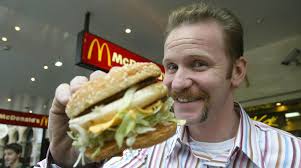Morgan Spurlock, who died Thursday at 53, did much to expand the noble world of documentaries.
Like Michael Moore, he showed that “look at me” can be a legitimate technique … and that a light approach can fit a serious subject.
And unlike most people, he showed that everyday subjects can be documentary-worthy. That began two decades ago, with “Super Size Me” (shown here).
Spurlock died of complications from cancer, a spokesman said. He left a rich body of work that fit neatly into the prime of cable-TV.
That began with “Super Size Me,” in which he said he ate three meals a day at McDonald’s for a month, taking the “supersize” option whenever it was offered. He said he gained 25 pounds and had depression and liver trouble.
Some of that later drew skepticism, especially when Spurlock admitted a longtime alcoholism that could have contributed to his other problems.
Still, “Super Size Me” opened up an important discussion of fast-food habits … and made an impression in the movie industry. It was reportedly made for $65,000 and grossed $22 million at the box office.
Cable TV was eager for his work, with multi-season runs of FX’s “30 Days” and Showtime’s “Morgan Spurlock: Inside Man.”
For the former, he started one season by spending 30 days on minimum wage and another by spending 25 days in prison. A longtime friend of his, a devout Christian, spent 30 days with a Muslim family in Michigan.
Throughout it all, there was a general feeling of understanding other worlds. That may have reflected Spurlock’s own perspective – a privileged, reddish-haired guy who grew up comfortably in a West Virginia coal town of 17,000.
He did light documentaries about “The Simpsons,” One Direction, “The Hangover, Part II” and (in “The Greatest Movie Ever Sold”) product-placement.
He also had a darker side. Two marriages ended in divorce and one in separation. In 2017, he wrote a blog admitting a history of sexual misconduct.
Spurlock then resigned from the company he’d created and never made another film. By then, however, he’s already produced 70 projects and directed 23 films, having a sharp impact on the documentary world.

Spurlock’s films had a super sized impact
Morgan Spurlock, who died Thursday at 53, did much to expand the noble world of documentaries.
Like Michael Moore, he showed that “look at me” can be a legitimate technique … and that a light approach can fit a serious subject.
And unlike most people, he showed that everyday subjects can be documentary-worthy. That began two decades ago, with “Super Size Me” (shown here).
Spurlock died of complications from cancer, a spokesman said. He left a rich body of work that fit neatly into the prime of cable-TV. Read more…